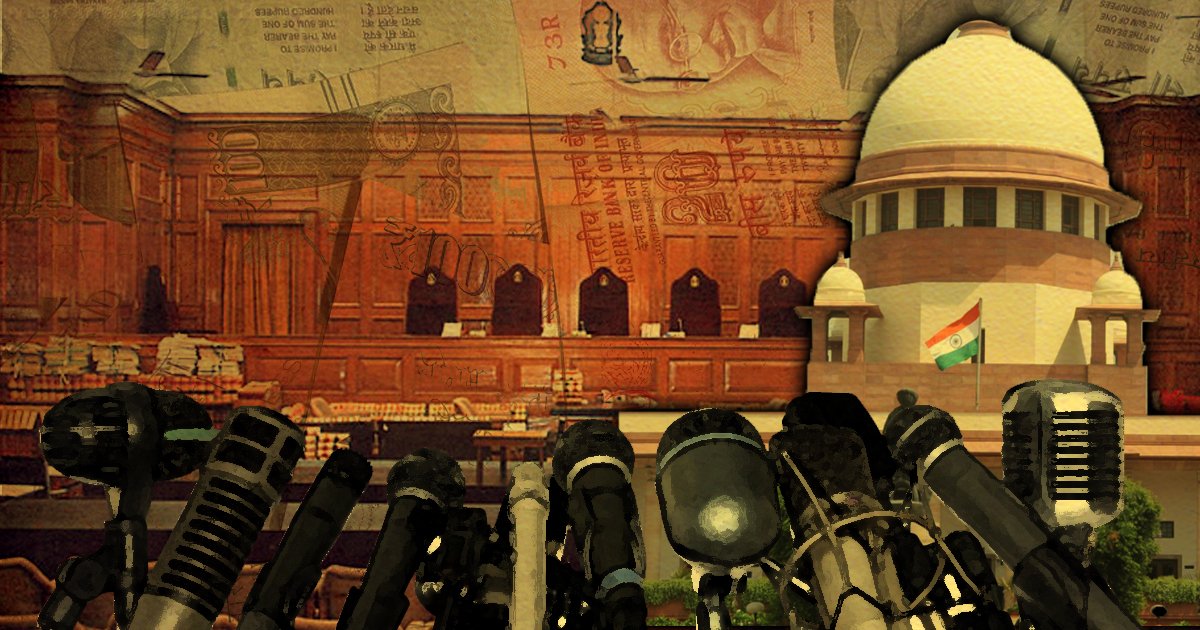
91 Lakh Of Taxpayer’s Money Spent On Replacement Of Unused Mic-System In The Supreme Court
20 Oct 2017 7:45 AM GMT
Whistle for Public Interest (WHIP), a group of law students and young lawyers working for the promotion of transparency and accountability in the affairs of public authorities, has sent a Representation to the Chief Justice of India, Dipak Mishra requesting him to ensure that the mic system installed in all courts be mandatorily used.
WHIP was founded by Kumar Shanu and Paras Jain in the year 2015. Whilst still in Law School, they argued multiple number of cases in public interest. The Delhi High Court RTI Rules framed by the Chief Justice of the High Court, were amended after a writ was filed by them. The duo also had taken the Chairman of the largest education board of India, CBSE, to the Supreme Court for not providing answer-sheets to the students under Right to Information (RTI). The judgement in the case was a victory of more than 50 lakh examinees who appear exams conducted by CBSE every year.
The representation, signed by law student Kapildeep Agarwal and Advocates Kumar Shanu and Paras Jain, states that the Supreme Court judges and advocates don’t to use the already installed mic system even in the overcrowded court rooms.
Interestingly, as per the information obtained by WHIP under RTI Act, 2005, it is revealed that the Supreme Court has spent Rs. 91,95,859 on Replacement of (unused) mic system.
The Supreme Court of India, admits the mic system is an inherent part of the courtroom infrastructure, in the same RTI response.
What does the Representation state?
“We, being the responsible citizens bring to your notice that, during our initial encounters with the overcrowded courtrooms of the Supreme Court of India as law students, we faced great difficulty in transpiring the Court Proceedings in almost every Court Room. A situation like this completely frustrates the purpose of Court Internships.”
They point out that this could be easily avoided with the use of already installed mic System in the Court Rooms. As per them this difficulty is not just limited to law interns – litigants face the same problems. “A Litigant not being able to properly observe the proceedings of his/her own case, is nothing but a travesty of justice.”
“Not only the litigants and law interns, Advocates also find themselves unable to effectively assist this Hon’ble Court without use of Mic System.”
The Representation states that concept of ‘Open Court’ has been recognized by Constitution and the civil and criminal procedural laws of India. Considering the Media being the only source of information for the public at large, it highlights the importance of free and reasonable access to the Court Proceedings for media. As per the Black Law Dictionary (2005 Edition), the meaning of ‘Open Court’ is interpreted as ‘A sitting of Court at the transactions of which the public are free to be present’.
Why the media too needs the use of mic-system?
“Media derives the fundamental right of freedom of press from Article 19(1)(a) of the Constitution of India. With the growing influence of digital media, there is a great rush to break the news in real time by the Media Persons. This might cause misreporting leading to irreparable loss to all the stakeholders involved.
Such misreporting can also invite Contempt of Court. The chances of misreporting may easily be minimized by the use of already installed Mic-System in the Court Rooms. “
The Representation contains multiple provisions of law, landmark judgements of Supreme Courts of India and the United Kingdom, photographs indicating use of mic system in International Court of Justice and courts of different countries of the world and a report of sub-committee of the National Courtroom Management System headed by Justice Baddar Durrez Ahmad. Justice Ahmed was also an invitee member of the E-Committee constituted by the Supreme Court. In its report, the Committee observed that, “there should be provision for sound amplification with microphones on judges table so that the judges questions/ directions to lawyers and witnesses are clearly heard by them.”
Wastage of public money?
The Representation further states non-use of mic system amounts to sheer wastage of public money and has no rationale, whatsoever.
“It is very painful to note that despite a considerable amount of public money being incurred in the installation and replacement of mic-system in courtrooms, the Supreme Court of India has not been able to ensure its use for proper administration of justice. Non-usage of already installed mic-system in all Court Rooms has no rationale and amounts to wastage of precious public money.”
The Logical Indian urges the Supreme Court to look into matter and take immediate steps to put to use the already existing mic-system.
 All section
All section













